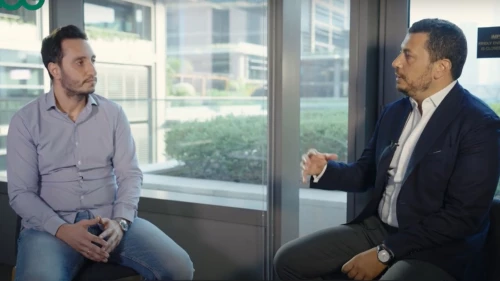Kitopi is among the world’s leading managed cloud kitchen platforms that cooks and delivers meals on behalf of restaurants to help them expand their delivery reach. Founded in 2018, today the company has 65 cloud kitchens operating in UAE, Saudi Arabia, Bahrain, and Kuwait, and is on track to achieve its bold mission—to satisfy the world’s appetite. Kitopi has built partnerships with more than 200 brands and last year launched a grocery vertical called “Shop Kitopi,” which is a one-stop shop to buy essentials and food items that promises delivery in 60 minutes or less. When asked about the genesis of the company name, Nasr is quick to respond. “Almost everyone is curious about where we got the name. But it’s really quite easy. We simply blended two words, kitchen and utopia.”
Recently, BCG Managing Director & Partner, Giuseppe Bonaccorsi, interviewed Jihad Bou Nasr to discuss Kitopi’s business model, expansion plans, customers and, of course, technologies.
Innovation Talks with BCG Middle East
Innovation Talks focuses on consumer and industry trends, highlighting the ways in which digital and innovative companies tackle their most ominous challenges, and what they have to offer their local customers.
Our featured guests discuss how digital is enabling new business models and innovations that do not yet exist in our region—but will soon—and offer advice to young entrepreneurs who want to learn more about setting-up and growing startups in Middle East.
The impact of COVID on businesses is an important part of the debate as it has changed consumer trends and introduced new ways of working that are re-shaping their culture.
What is your unique business model? In other words, what is Kitopi’s “secret sauce”?
Kitopi is a managed cloud kitchen platform. We operate kitchens in Dubai and the GCC. In fact, we started in Dubai and expanded across the GCC in a matter of three years. Today we operate kitchens and cook on behalf of restaurants and deliver food to their customers. Essentially, we are a service provider and “enabler” to restaurants—allowing them to scale more efficiently and cost effectively. Our clients do not have to worry about capital expenditures and building a team to scale to multiple locations.
In fact, we have moved from an enabler of restaurants to an enabler of the system at large. If you think about the food and beverage delivery sector, it is surprisingly unprofitable. Why? Because customers expect to pay the same amount of money that they pay in a restaurant as they pay at home. But, restaurants have to pay aggregators anywhere from 25 percent to 35 percent delivery fees. Kitopi steps in to support restaurants in reducing their costs, aggregating their labor, their rent, and operating in a more cost-effective manner. We have since grown to become an enabler of the ecosystem at large, not just restaurants.
Regarding your business models, what is Kitopi’s role in the overall value chain and what sorts of partnerships do you pursue?
We offer an end-to-end spectrum on food delivery. For restaurants, we offer sourcing, warehousing, distribution, food preparation, delivery, call centers, and data analytics. By covering the full end-to-end, we are already a strong enabler of the ecosystem. We allow our restaurants to focus on what they do best—which is marketing and product development—and we take care of all the rest. And we are continuing to invest in all aspects of the value chain so we are seen as a strong enabler. Not only to restaurants but also to the different components of the system.
Going forward, it empowers us to be seen as partners not only to restaurants but also to customers who want different products and services, to aggregators who want to consolidate demand in certain zones, and to suppliers who want to make sure that they have advanced orders on products. By capturing the full end-to-end aspect of the ecosystem, we become a stronger partner to all elements of the ecosystem.
How scalable is your business model in the GCC? Also, I hear that you are planning to expand in Southeast Asia. How will that model work?
That’s correct. Already, food delivery in the GCC is at an all-time high and has been growing steadily over the past three years. In fact, the food delivery business has grown 30 percent year-on-year for the past three years and is projected to continue growing over the next three years. Why the incredible growth? Because customers in the UAE want convenience. They're all connected. They're all “foodies” by nature. We see this especially in Saudi Arabia, Kuwait, and the UAE. So, as the food delivery business grows so do we as an enabler of the ecosystem. And yes, going forward, East Asia is a particularly opportunistic market for us. Why? Primarily because everybody's connected and there's a lot of demand for food delivery. The large aggregators such as Foodpanda and others have been there for more than a decade. Our plan is to expand to different clusters in Singapore, Malaysia, and Thailand and to grow toward East Asia and eventually to the Western Hemisphere and South America.
Let's talk about customers. What have you observed in terms of customer behavior pre-pandemic, during the pandemic, and post-pandemic?
That’s a good question. We've monitored customer behavior very closely. In fact, we have tried to pivot—to also support customer behavior and customer needs throughout our journey.
Pre-pandemic, food delivery was already a growing business, growing, as I mentioned earlier, at about 30 percent year on year. So, cloud kitchens and delivery food companies were already seeing success. When COVID-19 hit, customers were much more apprehensive about ordering food from restaurants. There wasn’t a lot of information in the early stages to indicate that food delivery was safe, so, in the first few weeks, we saw deliveries fall. So we had to pivot—to teach customers and inform them about the safety of our food kitchens and deliveries. Fortunately, even before the pandemic, we were implementing a lot of new technologies in our kitchens to ensure the highest standards for food safety and quality.
During the pandemic, we saw consumer behavior shift. As people became more apprehensive about food delivery, many started ordering groceries, thinking that cooking at home was safer. Again, we pivoted. We launched our own grocery app and, in a matter of a few weeks, we were in business from our homes. Afterall, we were also stuck at home. We started moving toward what customers wanted.
Within a few months, there was noticeable customer fatigue of cooking food at home. Countries began opening up and regulations began falling. We started seeing increased growth, almost equivalent to the pre-pandemic days. Indeed, growth is much faster as people have become used to being at home, working from home, and eating at home. People began ordering food more often than in the past. Essentially, COVID-19 may have “leapfrogged” the adoption of food delivery by customers who might never have ordered food delivery.
By investing in data analytics, we come up with solutions and products that our customers want.
Let’s talk about technology. Clearly, technology is a key enabler that allows you to ensure quality, accuracy, and speed of delivery. What is the secret behind your technology? Do you have an in-house proprietary technology?
Technology is probably the most important component that has enabled Kitopi’s success. Without technology, we would be operating kitchens at the same inefficiencies that today’s industry faces. Our technology allows us to overcome inefficiencies, which, in the restaurant business, are typically slow delivery, high costs, and poor quality. We decided early on to invest in technology in order to build our own proprietary operating system. Called Smart Kitchen Operating Systems, or SKOS for short, it comprises an in-house suite of applications focused entirely on operating cloud kitchens. We are among the first in the region with such an application. We built our own operating system to manage our kitchens and we continue to invest over and over. And not just in our operating system, but in IoT, robotics, automation, RPA, and other technologies that enable us to continue serving our customers with better quality, better accuracy, and better speed.
Sounds like Kitopi is a perfect example of a Bionic Company. Can you tell us more about your technology?
We integrate technology in all aspects of our business. There are three things we focus on that enable us to be, as you say, bionic. It starts with how we operate our teams. Essentially, teams focus on problems in a squad manner, meaning a group of individuals who work across functions on very short timelines and with very clear objectives. They are empowered to tackle problems from all aspects of the business and to create solutions as they see fit.
Second, we are bionic through technology. Our kitchens are breeding grounds for a host of technologies—from IoT devices that scan orders before they leave the kitchen (to ensure accuracy) to artificial intelligence (AI) that scans orders to confirm nothing is missing from the order and the food is going out correctly. And even robotics. Robotics are there not to replace people in the kitchen but to enable and support them, for example, providing sushi rolling machines and rice cookers in our kitchens.
Finally, data analytics is core to our business. By investing in data analytics, we come up with solutions and also products that our customers want. For example, providing dynamic offerings at different times of the day and launching new products based on data derived from customers’ orders. We have made significant investments in technology, which sets us apart in this industry.








